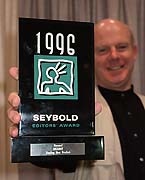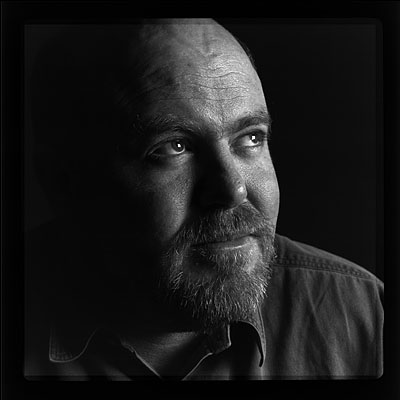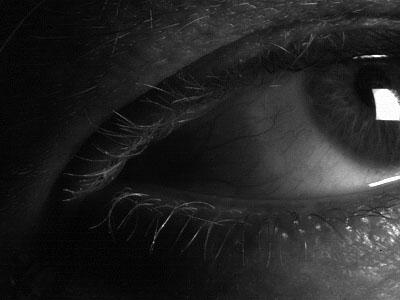A CCD bigger than film
by John Henshall

"... and the winner is ..."
Trevor Howarth, Dicomed President & CEO, displays the Seybold Editors' Award for "Sizzling New Product" at Seybold Boston

All instantaneous capture digital cameras produced
so far have one major drawback: their CCD sensors are smaller than the film
apertures of their adopted parent cameras.
Kodak cameras have their viewfinders masked-off to show the reduced area
of the CCDs, Fuji/Nikon cameras have relay optics which give full-frame
bright viewfinder images but restrict the maximum aperture of the taking
lens to f6.7. No one has quite filled the 24x36mm film aperture of a 35mm
film camera with a CCD - though the Kodak DCS460 comes close.
But now Dicomed, the small Burnsville, Minneapolis, company headed by Trevor
Haworth from Bury, Lancashire, have done it. No, not filled a 35mm film
aperture - Dicomed have jumped a format and filled the film aperture of
a Hasselblad. Well that's not quite accurate. In fact they have overfilled
it.
Loral Fairchild make the 3x3cm area array used in the Leaf digital camera
back. It is not exclusive to Leaf, however - both Megavision and Screen
use the same CCD. Loral also have a 6x6cm area array but this massive mosaic
of 4096x4096 pixels (total 16,777,216) is exclusive - to Dicomed. It 'overfills'
the film aperture because a 6x6cm Hasselblad back is, in fact a 5.6x5.6cm
back. Remember how we used to call it 'two and a quarter square'? Well that
was more accurate than '6x6cm'. Now, if I had a big rasp, maybe...
The chip was developed for satellite imaging. You know the kind of hype,
"able to read the Pravda headline in Red Square from out in space."
Though that was never quite true, these chips are serious technology. Unfortunately,
much of the market for them ended with the cold war. So what use do they
have when you can now read Pravda headlines at the National Airport news stand,
without ever having to leave Washington? With defence spending cuts, who
might buy this bleeding edge technology? Who would possibly have the money?
Why, photographers like you, of course.
It's a year since we first heard about Dicomed's instantaneous exposure
camera back, the BigShot, using the 6x6cm chip and - just as incredible
- a liquid crystal tunable filter which is able to deliver instant
colour within the twinkling of a flash. The filter is still not ready for
release but the good news is that the monochrome version is now ready to
ship at $35,000.
At Seybold Boston, the ever tolerant Trevor Haworth once again allowed me
to destroy his exhibition booth. Dicomed have had their fair share of (deserved)
enthusiastic coverage here, so I guess the upheaval is worthwhile. Anyway,
we always draw a crowd, keen to see some 'real' photography in action
I swept away the still-life set-up of flowers and Seybold Award for "Sizzling
New Product", turning out all but one of the lights and substituting
a subject so full of character and craggy detail that it was eminently suitable
for such a high resolution camera: the face of "The Photographer"
magazine's Art and Design Editor, Brian Whitehead.

My picture of Brian Whitehead was taken under such extreme circumstances
(90% crowd control, 10% creativity) that I began to imagine I was a wedding
photographer. I set the 150mm Zeiss Planar to its minimum object distance
and moved in until Brian's right eye was sharp. I used the same exposure
meter I use when lighting television productions. It's the only one that
counts: the camera. I guessed the aperture at f5.6. Click. Overexposed.
Stop down to f8. Click. Highlights just clipping. Down to between f8 and
f11. Click. Spot on. Yes, there are compromises. You remain tethered to
a computer, so weddings are out, and I had no opportunity to get the background
really black, to see what the Dicomed dark 'noise' is like. (Only joking,
Trevor.)

I then further disrupted Dicomed's Seybold booth by connecting my Macintosh
PowerBook 5300c to their PowerPC to copy over the 16MB raw image file. Well
I hope it was worth it, Dicomed. At least it made it to the front cover
and a double 'first'. First BigShot cover and first BigShot image to be
reproduced using Agfa's fabulous Crystal Raster screening technology.*
At the Seybold Editors' Awards, Trevor Haworth paid tribute to his bankers.
Itochu Corporation of Japan have backed a $27M exclusive deal with Loral
Fairchild to develop products based on the 6x6cm sensor.
When Dicomed say "Digital imaging without the compromise" they
mean it. Prices? The monochrome version is $35,000, sequential colour (three
exposures) $39,000, one-shot colour (now expected to ship in June 1996)
$55,000. Time to dip into your defence budget.
* The image appeared on the front cover of The Photographer magazine,
April 1996